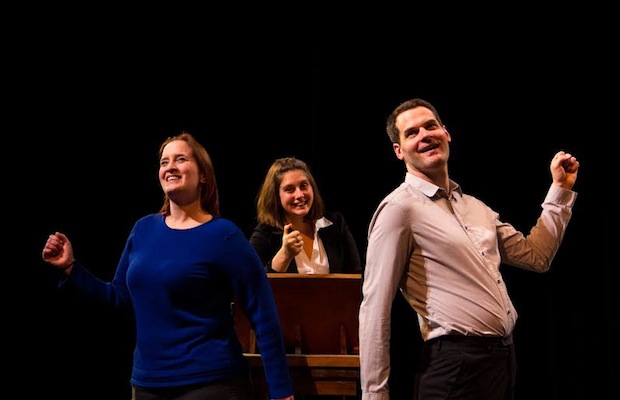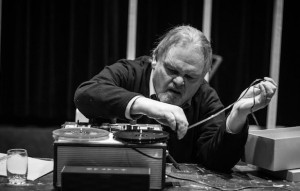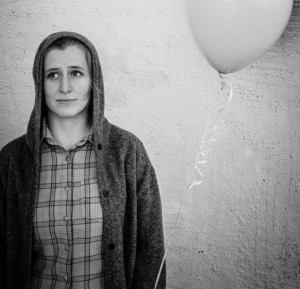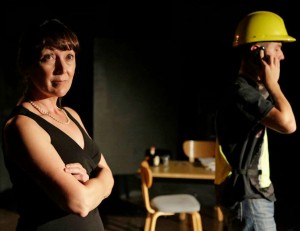
At its inception, under the mentorship of Harry and Elizabeth Boardmore, it was a one week affair with performances every night at the Lyceum Building on Sydney’s George Street and full length productions mixed in with evenings of one-act plays. It featured the student work of actors, writers, and directors who would become familiar to, not only Cape Breton audiences, but national audiences as well: Max MacDonald, Maynard Morrison, Kathy McGuire, and Kenzie MacNeil just to name a few.
When the College of Cape Breton moved to its new campus on the Glace Bay Highway and the Dramagroup (as it was styled then) into its own playhouse, the Festival soon changed its format. The full length productions and their much more involved production values were spread out over the fall and winter months and the one-act plays grouped in their own festival over alternate evenings in a week and half of performances.
Last year, the One Act Festival, now named for the late Elizabeth Boardmore, changed format again: all of the almost dozen plays were performed over four days of evening and afternoon performances. This year’s festival saw eleven productions over four days of three evenings and two afternoons (Thursday, March 20, to Sunday, March 23).
The change in the schedule seemed to have carried through to the intensity and style of the productions. With little time for technical preparations (while one evening of shows were moving their set pieces and props offstage, the next evening of shows were in the catwalks having their lights set), the performances dominated the production values and the production values had to be more integral to the production to make it worth the time and effort devoted to achieving them.

Some plays, like the second evening’s “All My Day Jobs” (written by Kirsten Van Ritzen, directed by Scott Sharplin) and Saturday evening’s “The Proposal” (written by Anton Chekov, directed by Sarah Blanchard) went for the production value gusto with a big set, projections, a slightly larger cast for what is a one-person monologue in “Day Jobs”, and some of the best use of costume design and execution I’ve seen in any production at the Boardmore. The production values added to the shows, but acting still carried the day with an incandescent performance by Mary-Jean Doyle as a struggling would-be actress in “Day Jobs” and a trio of brilliant comedic performances in the Chekov by Sam White, Lindsay Thompson, and Amber Tapley.

And the other plays used the vast black canvas of the Boardmore stage in inventive ways.
“One On One” (Friday evening, written by Guy LeLievre, directed by Lauren MacLeod) used a raised platform to suggest a prison cell and charming video projections by Ashley Harding to suggest an unthinkable crime but again it was the performances of the two actors, a committed, haunted one from Paul Bishop (who shaved a receding hairline onto his young pate, making him look like Rex Murphy’s more handsome nephew), and a quietly purposeful one from the immensely talented Lindsay Thompson.
“The Lover” (Saturday afternoon, written by Harold Pinter, directed by John Lingard) had a few elegant sticks of furniture to suggest upper-class British rectitude but sold its playwright’s comedic explosion of English sexual repression with two dead on performances from the luminescent Carrie MacDonald and the tumescent Chris Corbett (with a cameo from the always welcome and slightly fluorescent Mark Delaney).
“The Cave” (Saturday evening, written and directed by Wayne McKay) used some experimental theatre techniques to tell its story of parental quashing of childhood wonder but the sincerity of the cast (Lauren Ponee, Mark Sparrow, Marcie McKay, Jenna Lahey, and Ron Newcombe) sold the didacticism of the play and furthermore created one of the great theatre moments of the festival when Ponee created a huge painting onstage before the audience’s delighted eyes.

This year’s festival is also notable for being one of the few times I can remember when new, original scripts were in the minority. Three of them tackled big, ambitious themes and, to my mind, occasionally these themes moved them too far away from the humanity of their characters. In “On Waking”, the source of the main character’s travails was her mission to protect her younger sister but often the sister’s character (though offstage) disappeared from the script when it might have been central to every scene. “The Cave” had the tentative relationship between its two lawyer characters and might have told their story directly through them instead of the more abstract fable related by two audience addressing narrators. “One On One” had an interesting, cat and mouse by-play between its reporter and convict but the confrontational style of the journalist (instead of charming his prey into confession) failed to convince more than a few audience members that this character knew the basics of his profession. (As the director of “An Intermission” I can only fairly comment on the flaws in my direction of which I shall pass over in respectful silence.)
For four intense and exhilarating days, the One-Act Play festival covered an immense amount of ground—emotionally, thematically, and theatrically. As a playgoer and playmaker, I have been won over by a new festival. I’m not the only one: audience attendance at every performance seemed to equal or exceed that of previous years. No doubt, actors, writers, directors, and audience members are looking forward to next year’s 44th season.

